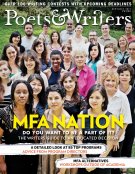After Otsuka’s debut was published, much was made of the “fairy-tale” story that Otsuka’s agent had given the manuscript of When the Emperor Was Divine to a Random House editor on a Friday, and by Monday Otsuka was given an attractive offer by Random House imprint Alfred A. Knopf. That is, in fact, a true story, but what usually gets left out of the telling is that Otsuka had worked on that manuscript for more than six years before she gave it to her agent. Similarly, The Buddha in the Attic has been nearly a decade in the making. But Otsuka doesn’t worry about a pace that many would consider painfully slow. “I really like the act of writing; it’s the same as painting in that I become engaged in the process of making stuff. What I love is the form and language. Each paragraph is like a puzzle.”
I really like the act of writing; it’s the same as painting in that I become engaged in the process of making stuff. What I love is the form and language.
Otsuka, who supports herself through her writing and speaking engagements, follows a specific writing routine because, as she says, “I’m very much a creature of habit.” Most mornings she does research, “reading source books and taking notes in large Clairefontaine notebooks with graph-paper pages. I love these notebooks because the paper is thick, and you can write on both sides without the ink showing through.” Several days a week she goes to the gym to swim or lift weights. Then, it’s off to “her” café.
Ever since the early nineties, when she needed time to regroup, Otsuka has gone to the Hungarian Pastry Shop in Morningside Heights near Columbia University. She begins by reading fiction. “The act of reading focuses my brain, calms it down, opens it up, makes me more receptive,” she says. “I like that there’s no music in the café. I prefer the silence or ambient white noise of people talking. Ideally, when I’m writing, I’m in a very meditative state. I can’t always get there, but there’s something about the ritual of going to the café every day and sitting in the same corner—my favorite table, in the back.”
Unlike the local Starbucks, this café does not have outlets to plug in laptops—Otsuka wouldn’t need one anyway. She used to write with a Waterman fountain pen but says she gave it up for pencils, the better to erase as she continuously revises, word by word, line by line. She writes in longhand on the back of loose sheets of paper (she likes to recycle), then goes home to type up changes on the computer and print out a copy to take with her to the café the next day. The process apparently works. Otsuka reports that she seldom gives a manuscript to anyone to read until it is complete, and once she submits it to her agent and editor, changes are minimal, rarely structural.
In both of her novels, Otsuka excavates and explores her personal Japanese heritage within a larger historical context. Her family has only distant relatives in Japan, in the mountains outside of Tokyo, and they have little contact even today. The summer after her freshman year at Yale, she went to Japan after studying the language in intensive workshops. She has not been back. Acknowledging that she and her mother experienced the “usual mother-daughter conflicts,” she describes her first book as a way of trying to figure out what happened to her mother during the war and how that experience formed her: “There was so much silence in my family about what happened during World War II, and a lot of repressed anger and sadness, too, so writing the novel helped me to understand what that silence was all about.” Researching and writing the second novel has, she says, given her a deeper understanding of the reticence and reluctance to stand out that is a hallmark of Japanese culture, an understanding that has brought her and her father, who still lives in California, closer. (Her mother suffers from Alzheimer’s disease.)
A fascination with the related notion of fate—of accepting the cards you’ve been dealt and making the best of it—is part of what drew Otsuka to the picture brides. In her new, slim novel, Otsuka focuses each chapter on the women’s common experience in the “invisible world,” as she describes their existence in America. She says that she floundered for about a year after When the Emperor Was Divine came out, knowing she wanted to write about the picture brides, but remaining uncertain of the form. She knew the book would start on a boat, and she eventually focused each chapter on the picture brides’ shared experiences and the public history that enfolds the lives of the issei, or first generation Japanese immigrants.









